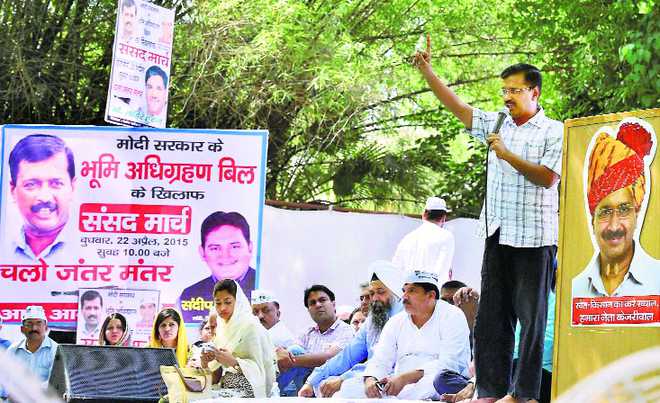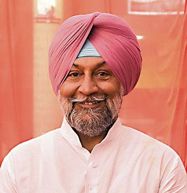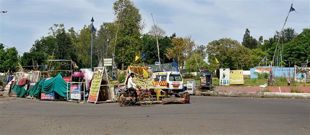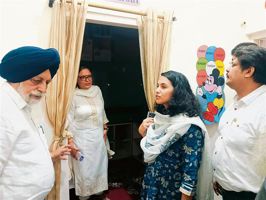
The Delhi CM Arvind Kejriwal addressing the AAP rally at Jantar Mantar, New Delhi. The pathetic response of the party made the farmer an object of politics in the blame game. PTI
Shiv Visvanathan
ON April 23, Gajendra Singh, a 40-year-old farmer from Rajasthan committed suicide by hanging himself from a tree in front of hundreds of people at an AAP rally in Delhi. The event captured media headlines yet somehow the readers felt that a lot of the story remained unsaid or untold. A friend of mine, a moviebuff told me that the Singh tragedy is a variant of the Rashomon story. In the Japanese movie, the director Akira Kurosawa, tells you of a murder from four different angles, shifting perspectives as if you are reworking a prism. In the Singh event, the story is told thrice to heighten the emptiness of the event.
Tragedy of agriculture
My friend said, the direct report of the event, the question of farmers’ suicide, and the overall tragedy of agriculture unfold together. All three levels capture the indifference to agriculture in middle class India today. It is as if we are content that food reaches us but we do not care about how it is produced or who produces it. The costs of seeds, or the fate of farming is not a part of the middle-class concern or contemplation.
My friend asked me to stop being knee jerk in my responses to the phenomenon. He asked me to read the event. The fact of farmers’ suicide is not new. Because the media presents it like a B- grade movie, our reactions, he claimed, cannot be mediocre.
The case of the farmer’s suicide becomes doubly obscene when we treat it like an isolated event. The scandal is not in the suicide but in the tragedy of farming and the obscenity of the societal response to it.
Objectivity of the gaze
The suicide of Gajendra Singh has to be retold differently. The narratives and commentaries in media treat Gajendra Singh as a token, a pretext for a narrative. The camera shots highlight his head dress. He appears like a puppet on a tree holding a broom, a strange figure, half clown, half protestor. He is up on a tree and the crowd watches him as a spectacle, an object of a gaze. It almost seems as if his inner desperation was something separate from his response to the crowd. Typically, one does not know whether he responded to the urging of the crowd or was determined to commit suicide. As he hung himself from the tree, Gajendra Singh moved from being a token, a half-hearted representation of a farmer-peasant, to becoming a spectacle and a specimen.
Politics today can only be a variant of one of the two and both attitudes subject the victim to the alleged objectivity of the gaze. The victim either becomes spectacle, a visual object for media cameras, or a specimen, a object for forensic science subject to police investigation. Between the media and the police, we consume a tragedy and banalise it. In fact, the attention shifts completely from the victim. Gajendra Singh is doubly dead, both in a physical and a historical sense.
The event is a pretext for politicians who forget that the tragedy of agricultural suicides has been with us for a decade —the dying farmer and the death of agriculture, yet politicians act as if the event is new. Their hypocrisy deprives Singh of agency. He merely becomes a pretext for another political spectacle, a show of concern by politicians, each blaming some other party for indifference.
The farmer, a dying species
The sadness is that it is not the Congress or the BJP one is talking about. It is society as a whole that has to confront the fact that the farmer is a dying species, a form of life disintegrating before our eyes. We confront today the tragedy of farmers who do not want to farm and who are determined that their children should not be farmers.
A way of life dies before us and we turn it into a slapstick drama of mediocre politicians, featuring Rahul, Rajnath Singh, all playing a B-grade skit called “the blame game”. The forensic eye of the police now reduces a person to a corpse waiting a pathological report when what we have to confront is the pathology of an entire society. Arvind Kejriwal completes the whitewash by washing his hands off the event. The farmer, from being a subject of history becomes a mere object of politics.
Time is central to farming. The sadness of suicide began decades back when agriculture moved from a subsistence economy to a cash economy. This was a shift in mentality and paradigms. Agriculture needed new inputs, more subsidies, it generated consumption and desire, it created the possibility of profits. The tragedy of the cotton exemplifies this. The cost of seeds, of fertilisers, created a system of inputs, which in turn created a debt economy which farmers could not cope with. As desire and want increased, debt increased and there was no set of institutions to care for the debtor.
Unable to pay his debtors, the farmer in desperation committed suicide, having hypothecated his land to the creditor. Families caught by surprise faced the trauma of debt and death as they faded into anonymity. The government used its favourite model of indifference and forgetting —the dole — to erase the event. Immediate grants were announced for grieving families as if a peremptory act of compensation had done justice to the poignancy of the event.
But there was something more pathetic occurring. It was the way AAP responded to the suicide. It was more than indifference and it reminded one of a Kafka story. It is about a village that agrees to perform a sacrifice. On full moon day, the priest arrives to perform the ritual but a tiger comes and eats the priest. The villagers refuse to give up and on the next full moon, the new priest arrives and the tiger repeats its performance.
The village community meets to discuss the crisis and the village idiot comes up with the solution. He suggests that the act of the tiger eating the priest becomes part of the ritual. Legend has it that the village idiot became a World Bank consultant. The banalisation of crisis is precisely what AAP tries to achieve by incorporating the suicide into strategy. The political tears it later shed were crocodile tears, especially those by Ashutosh on TV. It saw Gajendra Singh's act as a political possibility for exploitation and was cynical about it.
Problem of stereotypes
There is a deeper problem of stereotypes here. Suicide is usually seen as a lonely act of desperation. A farmer or two committing suicide would have hardly been news. But agricultural suicides reached epidemic form as over 350,000 people committed suicide. In the last two years, over 25,000 people committed suicide. Agricultural desperation had now reached an epidemic form and the only response was the inanity and the indolence of the state policy.
It was not as if they were no reports. A generation of social scientists and activists from BB Mohanty, Ajay Dandekar, AR Vasavi, E.Revati had provided detailed reports but such analysis failed to touch the collective conscience.
New testaments of growth
Like Narmada, Bhopal, Niyamgiri, the suicide of farmers remained a backdrop, a shadow effect of the new testaments of growth and development. Reading the discourse, one realised that keywords like suicide and agriculture had to be bracketed. The great French Sociologist, Emile Durkheim, felt suicide was not a problem of poor. Poverty was not a symptom of normlessness which only desire and aspiration could create. What one confronted was agriculture as anomie, where the farmer was caught in a ruthless rule game he could not cope with.
One saw this particularly among small cotton growers who made a transition, from subsistence to commodity agriculture. As a wag put it, “A new HYV agriculture became a HIV agriculture,” as farmers got caught in the vicious cycle of a high-input agriculture, borrowing to pay for the high levels of technical inputs.
What they confronted was a rapacious corporation, an indifferent banking system and an absent-minded state. As a result, crop failure and agricultural suicide became concurrent events. It was a tale of vulnerability that policy makers had no empathy for. Even attempts to rectify the situation by small farmers confronted an agricultural bureaucracy which added to the trauma. Between the bureaucracy, commercial enterprises, local shopkeepers the possibility of recovery diminished quickly.
Vote-bank politics
The stories were there, the information available, and yet the sensibility was missing. Many among the elite like Mr Chidambaram felt one should recognise that small-scale farming was not feasible anymore. Electoral and party democracy add its own sheen of cynicism. While over 25,000 farmers committed suicide in the last two years, politicians talked piously of loan waivers. An outsider would think they were Mother Teresas rather than rapacious players of electoral politics, vultures of vote-bank politics.
One began this analysis by showing the farmer was a token around which our country conducted the symbolic politics of agriculture. Policy and politics sang hosannas to the peasant and farmer, while agriculture was dying. Ignorance and hypocrisy intervened as the farmer traversed a symbolic drama as he moved from being token to symptom, spectacle to an empty symbol of the current hypocrisy of science and politics.
One senses that suicides might have been sad in their sense of loss and desperation, but the scandal began with the response, the obscenity of a society indifferent to the fate of small farmers. I guess that is what an aspirational society means. As you succeed, as growth becomes a fetish, you forget the defeated, the also rans. India has turned the epic of suicides from epic drama to a slap stick exercise of knee-jerk responses. It marks what one cynic dubbed the high tide of the new virus, the HIVs of indifference.
The writer calls himself a social sciences nomad



























